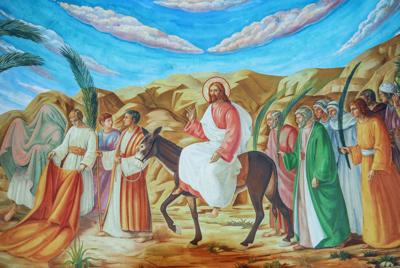This Sunday marks what Christians call “ Palm Sunday, ” the day commemorating when Jesus Christ and his disciples entered into Jerusalem before the religious festival of Passover, setting off a political and religious firestorm that would result in his execution by the following Friday. The story begins by recording Jesus riding a donkey from the Mount of Olives down through the Eastern Gate of the city. His appearance is met with fanfare.
The crowd swells with residents, religious pilgrims and a smattering of political radicals. As if to honor an approaching king, the crowd spreads their cloaks on the road to minimize the level of dust stirred up. However, as if to honor an approaching conquering king, the crowd also waves palm branches to stir up revolutionary hope.

You see, the palm was a symbol of Judean national identity, a people that were suffering and simmering under the weight of imperial Roman occupation. The crowds call out in desperation, “ Rescue us, Son of David !” Some see Jesus as heir to the long-lost royal dynasty of the legendary Hebrew King David. Others see him as a warrior-general sent by God to defeat their enemies on the field of battle.
Meanwhile, likely approaching from the city’s Western Gate for the same religious festival came Pontius Pilate, the governor of Judea and the extension of Caesar’s imperial power. Unlike the motley crew of disciples escorting Jesus on a donkey, Pilate would have entered Jerusalem escorted by soldiers and dignitaries as he strode in on a war horse. A few people call out in fealty, “Hail Caesar, son of God!” Of course, many don’t believe Caesar is really a god — only that it’s advantageous to keep fluffing a narcissistic ego of this magnitude.
That Pilate in this moment represented a form of coercive power is obvious. Anyone who would have cheered his entrance would have been, for whatever reason, expressing their loyalty to the Roman Empire. Likewise, the supporters of Jesus were clearly expressing their desire to be free of that same empire.
Palm Sunday emerged then as some kind of ancient royal rumble. Pilate in this corner. Jesus in this corner.
Secular ideology versus religious fervor. Caesar Augustus vs. King Jesus.
During this past election cycle, the maxim “Jesus is King” became something of a peculiar battle cry among the religious right. It was a mantra that was spontaneously shouted at rallies, both to cheer on some candidates and to heckle others. It felt as familiar as it was ironic.
Far from humble and lowly, this kind of King Jesus was the religious counterweight to their opponents’ secular power. The heir of the long-lost theocracy of a legendary Christian nation. The warrior-general sent by God to defeat their enemies at the ballot box.
A part of our human nature, what Christians call our “sin nature,” tempts us to see Jesus like this. We so desperately want Jesus parading in on a war horse that we try to ignore the donkey beneath him, which symbolizes peace. We call out, “Rescue us!,” hoping that Jesus will wage war with the same weapons our opponents have wielded against us.
Perhaps some of us do manage to resist the urge to openly hate our enemies, but that’s only because we expect King Jesus to hate them for us. What the crowds on Palm Sunday misunderstood about Jesus then is what many religious people still misunderstand today: Jesus did not come as an earthly king. Jesus came as heavenly king.
What separates the heavenly king from all other earthly kings is methodology. King Jesus doesn’t conquer as Caesar does. Caesar conquers with a sword.
Jesus conquers with a cross. King Jesus does not rule as Caesar does. Caesar rules with fear.
Jesus rules with love. King Jesus does not glory as Caesar does. Caesar glories in his ruthlessness.
Jesus glories in his mercy. The Kingdom of God was never meant to be successor to the Empire of Rome. It is not a near-peer rivalry.
It is completely alternative reality to any nation — Roman or American. No one, not even Jesus’ own followers, understood this on Palm Sunday. It was only in his resurrection on the following Sunday when such a divine revolution burst out with an empty tomb.
Yet now followers of Jesus can know that he is not only king, but also just what kind of king he is. Accepting no other pretenders to the throne, may we be loyal to this King Jesus. Colin Kerr Rev.
Colin Kerr is the founding pastor of Parkside Church in downtown Charleston and an ordained minister in the Presbyterian Church (USA). He is a happy husband, girl-dad to two daughters and author of " Faith Hope Love: The Essentials of Christianity for the Curious, Confused, and Skeptical .".
Technology

Faith column: Palm Sunday reminds us Jesus is a different kind of King

Some see Jesus as heir to a Hebrew king. Others see him as a warrior-general sent by God to defeat their enemies. We so want to see Jesus parading on a war horse that we try to ignore the donkey...















